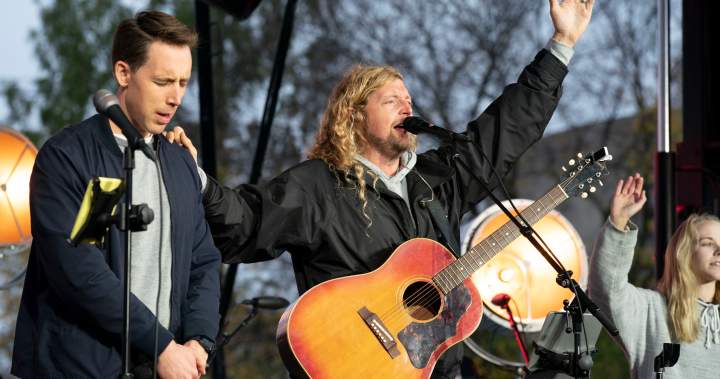The quiet shores of York Redoubt National Historic Site in Halifax rarely see political controversy. But on July 27, the historic fortification became ground zero for a clash between religious expression and public values that has left many Canadians questioning Parks Canada’s judgment.
American evangelical pastor Sean Feucht, known for his ties to the MAGA movement and anti-LGBTQ+ positions, held a controversial worship concert at the federal site. The event, part of his “Kingdom to the Capitol” tour, drew approximately 200 attendees – and a firestorm of criticism from local residents and advocacy groups.
“Parks Canada should never have approved this permit,” said Kevin Kindred, a Halifax-based human rights lawyer who helped organize a counter-protest. “This wasn’t simply about religious expression. Feucht has repeatedly demonized LGBTQ+ communities and spread harmful misinformation.”
The controversy centers on Feucht’s well-documented history. The California pastor has described the LGBTQ+ movement as “a darkness that needs to be dealt with” and has been vocal in his opposition to COVID-19 restrictions, calling them religious persecution. His political connections include performing at rallies for former U.S. President Donald Trump.
Parks Canada, meanwhile, finds itself navigating choppy waters. The federal agency initially defended its decision, citing its mandate to be “inclusive to all Canadians.” In a statement to media outlets, they explained that the site was rented as a venue, not as an endorsement of any group’s views.
Halifax Pride chair Adam Reid sees it differently. “There’s a difference between inclusivity and providing a platform for someone known to promote discrimination,” Reid told me during a phone interview. “The timing during Pride Month made this particularly hurtful to our community.”
The fallout has been swift. Nova Scotia NDP leader Claudia Chender called the decision “deeply concerning,” while Halifax MP Andy Fillmore expressed disappointment that a federal agency would provide space for views that run counter to Canadian values of inclusion.
On the ground, the scene was tense but remained peaceful. Approximately 40 counter-protesters gathered nearby, holding rainbow flags and signs promoting love and acceptance. Local RCMP maintained a presence to ensure public safety, though no incidents were reported.
For Halifax resident Emma Morris, who attended the counter-protest, the issue cuts deep. “This isn’t about freedom of religion,” she explained. “It’s about a U.S. political figure using Canadian public lands to spread a message that hurts vulnerable communities.”
Public records show Feucht’s organization, Hold the Line, paid the standard rental fee of $1,200 for the site. This raises questions about the vetting process for groups seeking to use national historic sites for events with potentially divisive messaging.
Parks Canada has since acknowledged the concerns raised by community members. In a follow-up statement, they promised to “review our policies regarding site rentals to ensure they align with our commitment to inclusion and respect for all Canadians.”
The incident highlights growing tensions across Canada as American culture wars increasingly find their way north. Similar controversies have emerged in Ontario and British Columbia, where American evangelical figures have held events that progressive Canadians view as incompatible with Charter values.
Legal experts point out the balancing act faced by government agencies. “There’s a tension between religious freedom and protection from discrimination,” notes constitutional law professor Catherine McKenna of Dalhousie University. “Public agencies must navigate these waters carefully, especially when taxpayer-funded venues are involved.”
For LGBTQ+ advocacy groups, the concerns go beyond a single concert. Halifax Pride has called for greater accountability and transparency in how public spaces are allocated. They worry about the precedent this sets for future events.
Tourism Nova Scotia estimates that Pride events bring approximately $4.5 million annually to the Halifax economy. Community leaders warn that incidents like this could damage the province’s reputation as a welcoming destination.
In response to mounting pressure, federal Environment Minister Steven Guilbeault, whose portfolio includes Parks Canada, has promised a review of site rental policies across the national parks system. “Our government stands firmly for inclusion and against discrimination of any kind,” Guilbeault stated in a press release.
Local faith leaders have also weighed in. Reverend Susan Chisholm of the United Church in Halifax emphasized that “most Christian communities in Canada embrace LGBTQ+ people fully. Mr. Feucht’s views represent a narrow interpretation that many of us reject.”
As the dust settles, this controversy leaves Canadians with difficult questions about the limits of free expression in public spaces. It also serves as a reminder that in our increasingly connected world, the cultural and political divides of our southern neighbor continue to find expression on Canadian soil.
For the residents of Halifax who gathered in protest that summer evening, the issue was simple: public lands should not be used to promote messages that undermine the dignity and equality of fellow citizens. As the federal government reviews its policies, many hope this incident will lead to clearer guidelines that better reflect Canadian values.
In the meantime, York Redoubt has returned to its usual quiet state, its historic walls having witnessed yet another chapter in the ongoing conversation about what it means to be truly inclusive in modern Canada.






